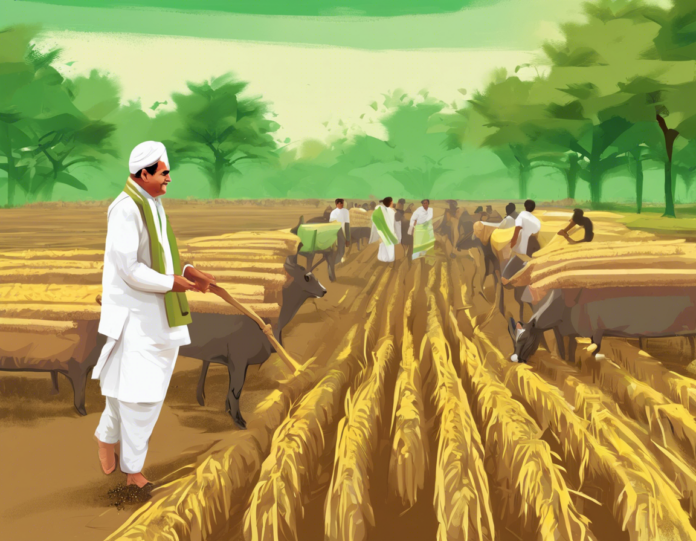Agriculture has been the backbone of the Indian economy for centuries, providing livelihoods to millions of families across the country. Recognizing the importance of farmers and their contribution to the nation, the government of Chhattisgarh launched the Rajiv Gandhi Kisan Nyay Yojana (RGKNY) in May 2020. This revolutionary scheme aims to boost the income of farmers and rejuvenate the agricultural sector in the state.
Understanding the Rajiv Gandhi Kisan Nyay Yojana
1. Background:
The RGKNY is named after former Prime Minister of India, Rajiv Gandhi, who was a strong advocate for rural development and empowerment of farmers. The scheme was launched by the Chief Minister of Chhattisgarh, Shri Bhupesh Baghel, with the vision of providing financial assistance to farmers and ensuring their welfare.
2. Objectives:
The primary objective of the Rajiv Gandhi Kisan Nyay Yojana is to supplement the income of farmers and improve their standard of living. By providing direct benefit transfers to farmers, the scheme aims to address agrarian distress, increase agricultural productivity, and stimulate rural economic growth.
3. Coverage:
The scheme covers all farmers in Chhattisgarh, including small and marginal farmers, tenant farmers, and sharecroppers. By including a wide range of beneficiaries, the government ensures that no farmer is left behind and that the benefits reach those who need them the most.
4. Financial Assistance:
Under the RGKNY, farmers receive a direct cash transfer for paddy and maize crops grown by them. The government provides financial assistance of Rs. 10,000 per acre for paddy cultivation and Rs. 13,000 per acre for maize cultivation. This financial support is aimed at reducing the input costs for farmers and increasing their net income from agriculture.
5. Payment Process:
The payments under the scheme are made directly into the bank accounts of the eligible farmers through the DBT (Direct Benefit Transfer) system. This helps in reducing leakages and ensuring that the benefits reach the intended beneficiaries in a transparent and efficient manner.
6. Impact:
Since its launch, the Rajiv Gandhi Kisan Nyay Yojana has had a significant impact on the lives of farmers in Chhattisgarh. The scheme has helped in increasing the income of farmers, improving their access to resources, and promoting sustainable agricultural practices. By empowering farmers, the government aims to boost rural development and create a more inclusive and equitable society.
Key Features of the Rajiv Gandhi Kisan Nyay Yojana
1. Targeted Approach: The scheme specifically targets farmers engaged in paddy and maize cultivation, providing them with direct financial assistance to support their agricultural activities.
2. Inclusive Coverage: By including small and marginal farmers, tenant farmers, and sharecroppers, the scheme ensures that a wide range of farmers benefit from the financial support.
3. Transparent Payment System: The use of the DBT system ensures that the payments are made directly into the bank accounts of farmers, reducing corruption and leakage of funds.
4. Income Support: The financial assistance provided under the scheme helps in supplementing the income of farmers, enabling them to invest in their farms, purchase inputs, and improve productivity.
5. Sustainable Agriculture: By promoting the cultivation of paddy and maize, the scheme encourages farmers to adopt sustainable agricultural practices that are beneficial for the environment and the community.
6. Empowerment of Farmers: The RGKNY not only provides financial assistance but also empowers farmers by giving them the resources and support they need to thrive in the agricultural sector.
Frequently Asked Questions (FAQs) about the Rajiv Gandhi Kisan Nyay Yojana
1. Who is eligible to benefit from the Rajiv Gandhi Kisan Nyay Yojana?
All farmers in Chhattisgarh, including small and marginal farmers, tenant farmers, and sharecroppers, are eligible to benefit from the scheme.
2. What crops are covered under the scheme?
The RGKNY provides financial assistance for paddy and maize crops grown by farmers in the state.
3. How much financial assistance is provided to farmers under the scheme?
Farmers receive Rs. 10,000 per acre for paddy cultivation and Rs. 13,000 per acre for maize cultivation.
4. How are the payments made to the farmers?
The payments under the scheme are made directly into the bank accounts of the eligible farmers through the DBT system.
5. What is the objective of the Rajiv Gandhi Kisan Nyay Yojana?
The primary objective of the scheme is to supplement the income of farmers, address agrarian distress, and stimulate rural economic growth.
6. How has the scheme impacted the lives of farmers in Chhattisgarh?
The RGKNY has helped in increasing the income of farmers, improving their access to resources, and promoting sustainable agricultural practices in the state.
7. Is there a registration process for farmers to avail the benefits of the scheme?
Farmers do not need to register separately for the scheme as the financial assistance is provided based on the area of land cultivated and the crops grown by them.
8. Can farmers use the financial assistance for purposes other than agriculture?
While the primary aim of the scheme is to support agricultural activities, farmers have the flexibility to utilize the financial assistance for various purposes that benefit their livelihoods.
9. How does the Rajiv Gandhi Kisan Nyay Yojana contribute to rural development?
By empowering farmers, increasing their income, and promoting sustainable agricultural practices, the scheme plays a crucial role in boosting rural development and creating a more inclusive society.
10. What are the future plans for the Rajiv Gandhi Kisan Nyay Yojana?
The government of Chhattisgarh continues to expand and improve the scheme to provide greater support to farmers and enhance the sustainability of agricultural practices in the state.
In conclusion, the Rajiv Gandhi Kisan Nyay Yojana stands as a testament to the government’s commitment to the welfare of farmers and the development of the agricultural sector in Chhattisgarh. By providing direct financial assistance, promoting sustainable agriculture, and empowering farmers, the scheme is paving the way for a brighter future for agriculture in the state.









